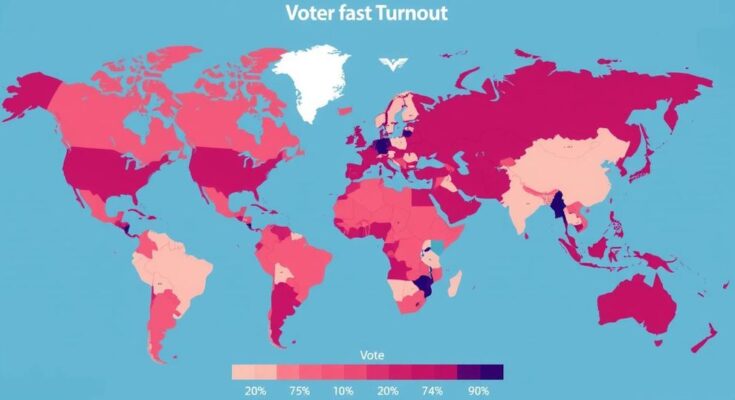In 2024, over 60 countries with nearly half of the world’s population participated in elections, marking a historic democratic milestone. The outcomes reflected voters’ immediate self-interests, heavily influenced by economic pressures, resulting in notable victories for populist leaders, while incumbent governments faced significant challenges. The global shift in electoral trends raises concerns about the future of democracy and international stability.
The year 2024 marked a historic milestone in global democracy, with over 60 countries comprising nearly half of the world’s population participating in elections. This unprecedented event was seen as a momentous occasion for the advancement of democratic principles. However, the outcomes revealed a disconcerting trend: many voters prioritized immediate personal interests over collective goals, influenced by fear and economic concerns.
In numerous industrialized regions like the United Kingdom, pressing economic issues overshadowed long-term challenges such as climate change. The electorate’s concerns about inflation and economic stability propelled Keir Starmer’s Labour Party to a significant electoral victory, which had been in opposition for fourteen years against the Conservatives. Likewise, President Joe Biden’s administration faced backlash due to inflation rates, despite wage stagnation and an economy that showed little sign of recovery.
As elections unfolded, various governments faced upheaval. In Germany, Chancellor Olaf Scholz’s coalition was ousted after a no-confidence vote, igniting the call for early elections in 2025. Globally, nations from Algeria to Tuvalu witnessed a strengthening of democracies, contrasting starkly with eras when voting rights were limited.
Incumbents faced severe challenges worldwide, with Indian Prime Minister Narendra Modi’s party suffering a decline and South Africa’s governing party losing its majority for the first time. Remarkably, while Mexico exhibited a different trend with the ruling party gaining popularity, Bangladesh’s Prime Minister Sheikh Hasina faced drastic protests, underscoring a disconnect between electoral victory and public trust.
Trump’s election in the United States emerged as a significant turning point, marked by a return to populism amidst economic dissatisfaction. Macron in France experienced a similar decline despite being perceived as a stabilizing force against the rising tide of populism. Both leaders confronted economic pressures largely beyond their control, exacerbated by global events such as the COVID-19 pandemic and the Russian invasion of Ukraine.
Putin’s electoral supremacy in Russia was starkly devoid of democratic principles, with his overwhelming victory serving as a reminder of the dangers posed by authoritarian regimes. Looking ahead to 2025, the implications of a possible Trump-Putin alliance raise substantial concerns for global democracy, particularly regarding Ukraine’s ongoing struggle for independence.
In summary, 2024’s electoral landscape demonstrated the complexities of global democracy, highlighting underlying themes of economic distress affecting voter behavior. The choices made resonate beyond national borders, influencing international stability and democratic ethos. The overall narrative underscores the need for vigilance in preserving democratic values while adapting to the evolving political climate.
The article examines the significant electoral events of 2024, where nearly half of the world’s population engaged in voting across over 60 countries. It highlights the historical importance of this phenomenon in the context of global democracy, noting that despite the extensive participation, the results indicated a troubling tendency of voters prioritizing immediate personal concerns over broader societal issues. This background sets the stage for understanding the complex dynamics of political behavior in 2024, including the impact of economic factors on electoral outcomes around the world.
The elections of 2024 revealed important insights about contemporary democracy, showcasing a remarkable participation across numerous nations while simultaneously highlighting the challenges faced by incumbents. Economic concerns emerged as predominant drivers of voter behavior, resulting in a shift towards populist leaders. As the global democratic landscape continues to evolve, the intersection of national decisions and international implications underscores the responsibility of electorate choices in shaping the future of governance worldwide.
Original Source: www.cnn.com




